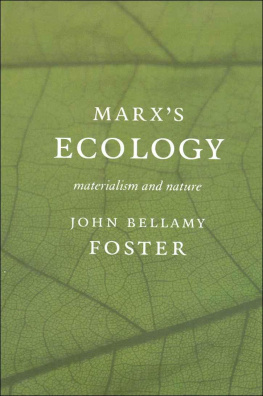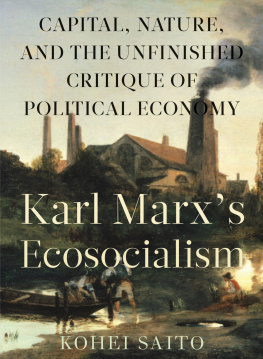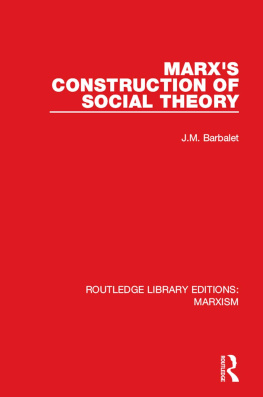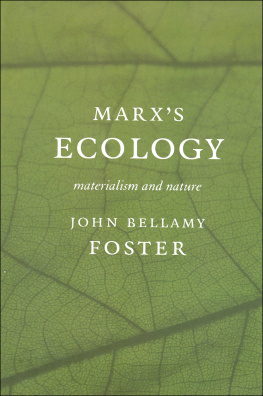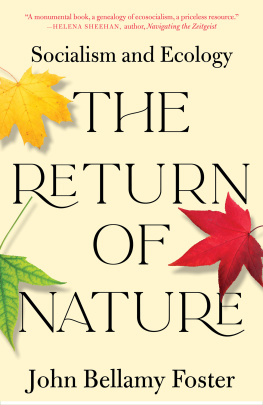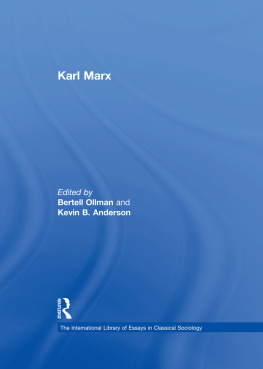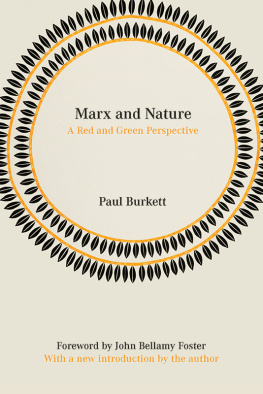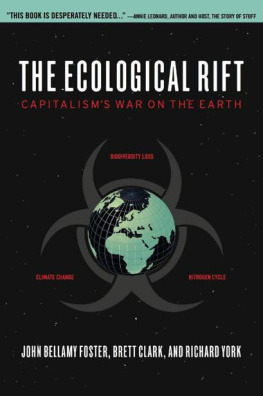MARXS ECOLOGY
MARXS ECOLOGY
Materialism and Nature
JOHN BELLAMY FOSTER

Copyright John Bellamy Foster 2000
All Rights Reserved
Library of Congress Cataloging-in-Publication Data
Foster, John Bellamy.
Marxs ecology : materialism and nature / John Bellamy Foster,
p. cm.
Includes bibliographical references and index.
ISBN 1583670114 (cloth). ISBN 1583670122 (pbk.)
1. Communism and ecology. 2. Marx, Karl, 18181883. I. Title.
HX550.E25F67 2000
577dc21
9938837
CIP
ISBN 1583670122 (paper)
ISBN 1583670114 (cloth)
ISBN 13 978-1-58367-012-5 (paper)
Monthly Review Press
146 West 29th Street Suite 6w
New York, NY 10001
CONTENTS
PREFACE
The original title for this book, at its inception, was Marx and Ecology. At some point along the way the title changed to Marxs Ecology. This change in title stands for a dramatic change in my thinking about Marx (and about ecology) over the last few years, a change in which numerous individuals played a part.
Marx has often been characterized as an anti-ecological thinker. But I was always too well acquainted with his writing ever to take such criticisms seriously. He had, as I knew, exhibited deep ecological awareness at numerous points in his work. But at the time that I wrote The Vulnerable Planet: A Short Economic History of the Environment (1994), I still believed that Marxs ecological insights were somewhat secondary within his thought; that they contributed nothing new or essential to our present-day knowledge of ecology as such; and that the importance of his ideas for the development of ecology lay in the fact that he provided the historical-materialist analysis that ecology, with its generally ahistorical and Malthusian notions, desperately needed.
That it was possible to interpret Marx in a different way, one that conceived ecology as central to his thinking, was something that I was certainly aware of, since it was raised day after day in the 1980s by my friend Ira Shapiro, New York-expatriate, farmer, carpenter, working-class philosopher, and at that time a student in my classes. Going against all the conventions in the interpretation of Marx, Ira would say to me look at this, pointing to passages in which Marx dealt with the problems of agriculture and the circulation of soil nutrients. I listened attentively, but did not yet appreciate the full import of what I was being told (in this I was no doubt held back, in contrast to Ira, by the fact that I had no real experience in working the land). In these same years, my friend Charles Hunt, radical activist, sociologist, part-time professor, and professional beekeeper, told me that I should become better acquainted with Engelss Dialectics of Nature, because of its science and its naturalism. Again I listened, but had my hesitations. Wasnt the dialectic of nature flawed from the outset?
My path to ecological materialism was blocked by the Marxism that I had learned over the years. My philosophical grounding had been in Hegel and the Hegelian Marxist revolt against positivist Marxism, which began in the 1920s in the work of Lukcs, Korsch, and Gramsci, and which had carried over into the Frankfurt School and the New Left (part of the much greater revolt against positivism that dominated European intellectual life from 1890 to 1930 and beyond). The emphasis here was on Marxs practical materialism, rooted in his concept of praxis; which in my own thinking came to be combined with the political economy of the Monthly Review tradition in the United States, and the historical-cultural theories of E.P. Thompson and Raymond Williams in Britain. There seemed little room in such a synthesis, however, for a Marxist approach to issues of nature and natural-physical science.
It is true that thinkers like Thompson and Williams in Britain, and Sweezy, Baran, Magdoff, and Braverman associated with the Monthly Review in the U.S., all insisted on the importance of connecting Marxism to the wider natural-physical realm, and each contributed in his way to ecological thinking. But the theoretical legacy of Lukcs and Gramsci, which I had internalized, denied the possibility of the application of dialectical modes of thinking to nature, essentially ceding that entire domain to positivism. At the time, I was scarcely aware of an alternative, more dialectical tradition within the contemporary life sciences, associated in our time with the work of such important thinkers as Richard Lewontin, Richard Levins, and Stephen Jay Gould. (When this awareness finally did dawn on me, it was a result of Monthly Review, which has long sought to link Marxism in general back up with the natural and physical sciences.) Nor was I yet acquainted with the critical realism of Roy Bhaskar.
To make matters worse, like most Marxists (outside of the biological sciences, where some of this history was retained), I had no knowledge of the real history of materialism. My materialism was entirely of the practical, political-economic kind, philosophically informed by Hegelian idealism and by Feuerbachs materialist revolt against Hegel, but ignorant of the larger history of materialism within philosophy and science. In this respect the Marxist tradition itself, as it had been passed down, was of relatively little help, since the basis on which Marx had broken with mechanistic materialism, while remaining a materialist, had never been adequately understood.
It is impossible to explain the stages (except perhaps by pointing to the argument that follows) of how I finally came to the conclusion that Marxs world-view was deeply, and indeed systematically, ecological (in all positive senses in which that term is used today), and that this ecological perspective derived from his materialism. If there was a single turning point in my thinking, it began shortly after The Vulnerable Planet was published when my friend John Mage, radical lawyer, classical scholar, and Monthly Review colleague, said that I had made an error in my book and in a subsequent article in tentatively adopting the Romantic Green view that capitalisms anti-ecological tendencies could be traced in considerable part to the scientific revolution of the seventeenth century, and in particular to the work of Francis Bacon. John raised the question of the relation of Marx to Bacon, and the historical meaning of the idea of the domination of nature that emerged in the seventeenth century. Gradually, I realized that the whole issue of science and ecology had to be reconsidered from the beginning. Among the questions that concerned me: Why was Bacon commonly presented as the enemy within Green theory? Why was Darwin so often ignored in discussions of nineteenth-century ecology (beyond the mere attribution of social Darwinist and Malthusian conceptions to him)? What was the relation of Marx to all of this?
I concluded early on in this process that attempts by ecosocialists to graft Green theory on to Marx, or Marx on to Green theory, could never generate the organic synthesis now necessary. In this respect I was struck by Bacons famous adage that, We can look in vain for advancement in scientific knowledge from the superinducing and grafting of new things on old. A fresh start (instauratio) must be made, beginning from the very foundations, unless we want to go round for ever in a circle, making trifling, almost contemptible progress (Novum Organum). The problem then became one of going back to the foundations of materialism, where the answers increasingly seemed to lie, reexamining our social theory and its relation to ecology from the beginning, that is, dialectically, in terms of its
Next page
